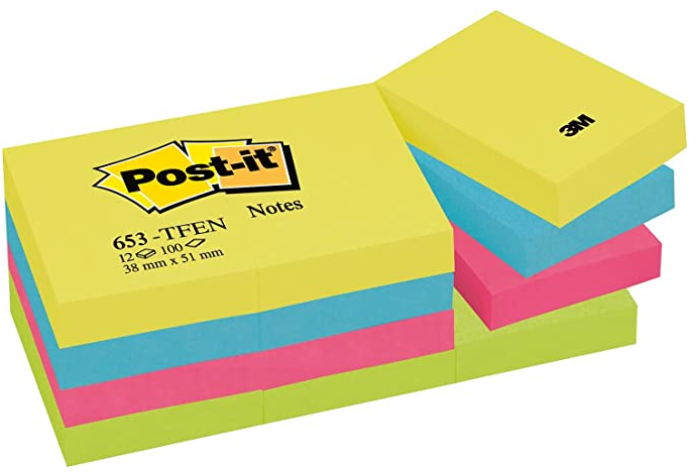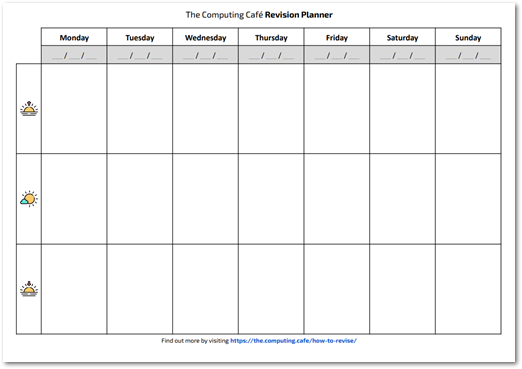how to revise
If you fail to plan, you plan to fail. 15 steps to revision success.
Don't rely on someone else to revise for you
There is an overwhelming push in schools and colleges to ensure that students perform well in exams. Schools and colleges rely on performance in exams for status, ratings and ultimately bums on seats and funding. Even though teachers and lecturers have limited control over what their learners ultimately do outside the classroom, education leaders have pushed them to produce revision resources for learners ("knowledge organisers" 😠) rather than giving teachers the time and resources to show learners how to develop their own revision skills. I suppose it ultimately comes down to control.
The skills you will learn are life skills. Don't underestimate how important they will be.
0
Take care of yourself
Grey matter
Get a decent amount of sleep
Drink lots of water
Eat well
Go out for a walk once a day to get some fresh air and exercise
1
Make a plan
Yes, yes. I know you've heard it all before but you absolutely need to plan what you are going to do. However, here are some tips to make it fun (yes, fun) 🤡. To help you out, download my revision planner template (see point 5 as well).
2
Give yourself enough time
Time is a valuable commodity and if we don't allow ourselves access to enough of it, then stress levels will rise. Make sure you are aware of the timescales for your revision. Start early.
3
Work backwards from the goal.
In this case, the goal is probably the exam(s) or test(s) that you are revising for, but it could be a coursework session or project day.
Make sure you have copies of your individual exam timetable from school/college.
Don't rely on your mates to tell you when the exams are.
Make sure you know whether they are in the morning or the afternoon.
4
Work out how much you've got to do.
Be realistic but don't underestimate the size of the task. Time has a habit of not waiting for you and, if you are blasé about the scale, you are likely to run out of time. Better to have more time than not enough (see point 2).
Make sure you gave copies of the actual exam-board-specification that you are following.
If the subject has more than one exam, pay attention to what content is covered in each one.
5
Print out enough copies of the revision planner
From now until the last exam, work out how many weeks there are. Print out enough copies of my revision planner template - one for each week.
6
Mark on the exams
Write details of all your exams in the spaces on the revision planner. They are likely to be morning/afternoon sessions which fits in nicely with the time slots.
Write on the start time of each exam.
Write on the length of each exam.
For subjects with multiple exams, make sure you write which paper it is.
7
Share your planning
Stuff goes wrong. Time slips away. You need all the help you can get. Making your planning public will help you and your family to support you.
8
Chunk the content
⚠️ WARNING: This bit is quite scary (so you'll be glad you started early). Always start from the big picture - start shallow, not deep. If you give into the detail, you'll get stuck in the weeds and drown before you reach the other bank.
You'll use the outcome of this step to populate your revision planner.
The revision planner is designed to accommodate the smaller Post-It notes which are 51mm x 38mm.

Other makes are available
Because time has a habit of catching up with you, using notes like this makes it easier to flex your revision timetable if you need to.
Work from the headings in the specification, writing enough content to fill a single revision session onto each note.
If you feel that you may run out of time, you may need to put more content onto each note but remember, this means that you won't be able to cover it in as much depth.
Stick the completed notes on a piece of paper to keep them safe until you are ready to populate your revision timetable.
REPEAT THE PROCESS FOR EACH SPECIFICATION/EXAM THAT YOU ARE REVISING FOR
9
PANIC!! (then don't panic)
Let's get the notes onto your revision planner.
Spread your notes across the planner. Give yourself some breaks - don't expect yourself to work solidly all day, every day.
Don't put the same subject on the same day more than once.
Put "harder" subjects in sessions where you know you'll be able to concentrate better. This will depend on you - you may study better in the morning, afternoon or evening.
With any luck, you'll run out of notes before you run out of revision slots...
10
🤦 I've run out of revision slots
Damn. There are two ways of dealing with this:
1
Start revising earlier (this is why you start planning early)
2
Double up revision sessions (remember this means your revision will be shallower)
UNDER NO CIRCUMSTANCES screw up any of the notes you have written whilst saying "it's ok, I know that". This is not a good idea - you can guarantee that...
you don't really know it that well and/or
it's probably the bit you know least well and/or
it's probably the bit you don't like and/or
it'll definitely come up on the exam.
11
Stand back and admire your work
Be proud of your planning. It's beautiful.
12
Start actually revising.
Ahhh!
When you are revising...
Use a variety of methods during your revision: Your brain loves variety.
Be active, not passive: Challenge your brain and you are more likely to retain information.
Keep it challenging: Ask questions, critique the information you read, double check it.
Remember, when revision, it doesn't matter what you do as long as you do something. Choose:
mind maps
concept maps
brain dumps
practice past questions
make up quizzes
critically watch YouTube videos
do a google search
make a webpage
record audio
make a video
write notes
13
Review your progress
After every revision session, look back at your planner. If you've covered all of the content you planned to, great. Cross it out and be proud. If you didn't manage to cover everything, cross out the bits you did, write another note out with the content you missed and pop it in a suitable/spare slot on your planner.
If you miss a session completely, simply remove the note and place it in a free slot later on. Once you've done this a couple of times, you'll start to realise how dangerous this is and you'll try harder not to skip your revision in future.
DON'T LIE TO YOURSELF - IF YOU MISS A SESSION, YOU MISS IT. SOLVE THE PROBLEM, DON'T IGNORE IT
14
Take your exams
Obviously, at some point, you'll sit the exams. Hopefully, you will be prepared and confident. Enjoy sharing your knowledge and skills. Be proud.
Time to party!
Last modified: February 14th, 2024






















